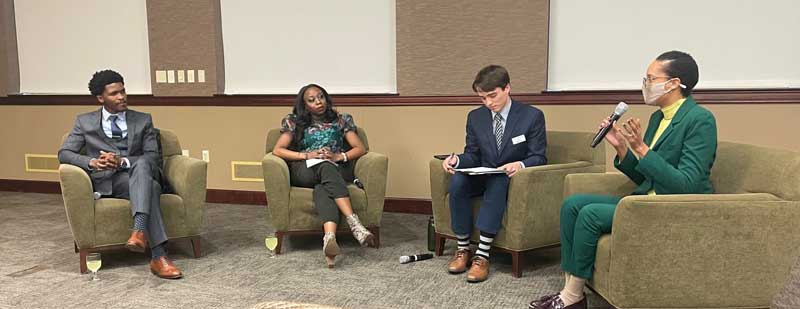A crowd of more than 100 people – among them College of Saint Benedict and Saint John’s University students, alumni, senior citizens and interested observers – jammed a second-floor meeting room at the Gorecki Center on Thursday night April 7 to hear a keynote address about global activism, youth and social movements.
Doubtless the reason so many turned out was because the speaker is a relative of South African civil rights icon Nelson Mandela, who died in 2013. Some in the audience wore T-shirts bearing his resemblance, and Siyabulela Mandela, Ph.D., was crowded by attendees before and after the hour-and-a-half event, which also featured a roundtable discussion with Angela Rose Meyers, former president of the Minneapolis NAACP.
“Many of you will be surprised to learn that 22 years ago, here in Minneapolis, Nelson Mandela spoke at an NAACP fundraising event, and many of the issues that we will be deliberating upon – the issues that we as young people here today would be engaged with – were the very same issues that 22 years ago Nelson Mandela spoke about,” Siyabulela Mandela said. “The issues of discrimination, systemic racism, violent forms of social injustice so prevalent today were the very same issues that faced the previous generation. What has went wrong to us as a human race that 22 years later we are still talking about the same issues?”
Siyabulela Mandela was appearing as part of a residency sponsored by the Eugene J. McCarthy Center for Public Policy and Civic Engagement, as well as the CSB+SJU Multicultural Center. A humanitarian, scholar and global activist, he works as a regional project manager in eastern and southern Africa as a part of Journalists for Human Rights. However, he arrived in St. Joseph on March 24 and is teaching a one-credit course on global activism and will be on campus through April 20. He has a master’s in conflict transformation and a Ph.D. in international relations and conflict resolution from the Department of Politics and History at Nelson Mandela University in South Africa.
“It is a shame that our generation is still concerned and our present and future is still tainted by the decisions of previous generations,” Mandela said. “We have been gifted with colonialism, vicious and violent institutions like slavery and apartheid and institutionalized racism. But I say to you, if it was possible for the past generation to wage a relentless struggle to wage victory against slavery and colonialism and declare victory over different forms of social injustice in their time, it is possible for us to perhaps turn the tide of history.
“When me and you are still discriminated against and judged, when the system of justice in the United States is still skewed along racial lines, what is the purpose of this generation? If we haven’t defined our vision and what strategies and tactics as young people that we are going to use, then perhaps this generation and generations yet to come are doomed.”
He said the youth of today has tools with which to fight these battles that weren’t available before, like social media and instant communication via the Internet that can be used to “build bridges” across ideological, cultural, international, economic and racial lines.

A crowd filled an upstairs conference room at the Gorecki Center listening to Siyabulela Mandela.
“I thought it was fantastic,” Matt Lindstrom, Ph.D., director of the McCarthy Center, said of Mandela’s speech. “You could see there was a lot of enthusiasm in this crowd. There were a lot of finger snaps and it felt like a call to action. We want the McCarthy Center to be a public resource and it’s important to have discussions like this where the message cuts across different areas of society. I think he’s given us all a message to think about.”
One of those intrigued by the presentation was Amiayah Espinal, a CSB communication major.
“I think it was engaging,” Espinal said. “He didn’t sugarcoat anything. I didn’t have any expectations. But I was intrigued to find out what was going to be said.”
And, indeed, he left the audience on an inspiring note.
“The words I’m speaking to you are nothing new,” Mandela said. “This is the same tone Malcom X and Rosa Parks and Dr. Martin Luther King and Nelson Mandela used years ago. What will it take to free ourselves? … I believe that we are the change we have been waiting for.”

Siyabulela Mandela (left) participated in a panel discussion with Angela Rose Meyers (right), former president of the Minneapolis NAACP.

Siyabulela Mandela, Ph.D., delivers the Eugene J. McCarthy Center for Public Policy and Civic Engagement keynote speech Thursday night at the Gorecki Center.
